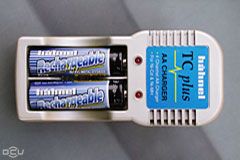
One word of warning before we talk about charging batteries. Never try to charge nonrechargeable batteries. They might overheat or even explode.
The two main types of chargers are quick chargers and slow ones. Contrary to what some people believe, quick chargers do not reduce battery life as long as you use a smart charger, designed for your type of battery.
Most quality chargers are intelligent enough to stop charging when batteries are full. However, you can calculate charging time by dividing the capacity of the battery by the charge rate of the charger, increase the amount by about 20% to allow for a certain amount of inefficiency and then remove it from the charger.
Overcharging is the most common cause of premature battery failure, and this can happen with cheap chargers that usually charge for a fixed period of time.
Smart chargers will monitor temperature, time and current to ensure batteries are not overcharged. Trickle charging - where a continuous low charge of about 1/10th of the battery's capacity is applied, is not recommended by most manufacturers. It is better to fully charge batteries and then store them in a cold place like a refrigerator. They will hold their charge for quite a few months, but let them adjust to room temperature first before use.